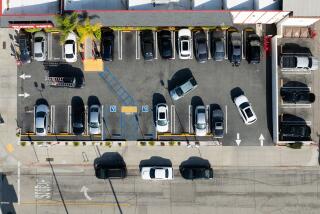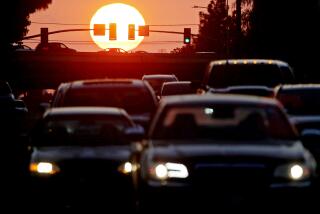Planners Would Slow Cars to Enhance Pedestrian Life
- Share via
The slow pace of automobile traffic on urban streets--making deliveries difficult and consuming the precious time of customers and sales representatives--worries many business people. But some traffic planners are working to make traffic in the future move less smoothly.
Narrower roads and trees planted by roadsides or on medians to reduce visibility and other devices to make drivers slow down and pay more attention may soon be incorporated into road design in business districts and downtown settings. The reason: Slower traffic means fewer automobile accidents, roads that are easier for pedestrians to cross and less noise.
Increasingly, city designers and even urban transportation experts are abandoning the mentality of “car is king.” In West Germany, traffic planners recently met to exchange ideas on interrupting and slowing traffic flow, with the goal of moving away from traffic-oriented design. Traffic planners say they don’t wish to make driving more frustrating but hope instead to keep traffic flowing at a slower but constant pace.
These traffic-slowing efforts could make some people less willing to patronize distant shopping or business centers, but they could also encourage trips, particularly by pedestrians, to safer, more peaceful local business areas. In the downtown of many U.S. cities, “walking will be the most important mode of transportation in the future,” says John Fondersmith of the Washington Office of Planning.
Odors Alter Behavior but in Different Ways
Do you feel depressed or have a hard time accomplishing anything at work when it rains? Or do you worry about falling asleep when you’re driving? Your nose may be the answer to your worries in the future. Scents and odors are likely to be used to help workers become more efficient, keep drivers alert on long trips and even ease the tensions of hospital patients.
Aroma disks and other scent-producing technologies will spread the smell of fresh-brewed coffee and other odors that can actually change people’s behavior. The key will be for businesses to find and use aromas that make workers happy.
Doing this will be tricky, according to H. Wayne Ludvigson, a psychologist and aroma researcher at Texas Christian University. Researchers have discovered that not all people react the same way to the same smell. For example, the aroma of lavender elevates the mood of depressed people but depresses people who are feeling good. And the smell of cloves seems to depress women and elate men.
Growth Among Singles Will Change Demand
Being single is, for most, a temporary status, but more Americans are spending a substantial part of their adult lives unmarried. This growing number of adult singles in the future will affect everything from housing to jobs.
The number of single adults in the United States will continue to climb as more young adults delay first marriages, as more middle-aged people divorce and as others simply choose not to marry. According to a recent U.S. Census Bureau report, “for young men and women today, it is plausible to assume that approximately 10% will never marry.”
This growth in the number of singles will increase the market for smaller housing within the reach of one income. While most home builders have traditionally constructed family-size housing, a growing number of singles who want to own their own homes could change the minds of housing developers. At the same time, a growth in singles will mean that a sizable portion of the population will have greater mobility, moving from job to job or even city to city as they please. This could make it more difficult to predict the strongest job or housing markets of the next decade.
The market for consumer goods aimed at young, middle-aged and older singles will boom. Look for individual-sized food products, smaller appliances and singles-oriented entertainment services as well as smaller cars and even single beds to be hot consumer items of the 1990s. There will also be a strong demand for products and services aimed at single parents and their families.






